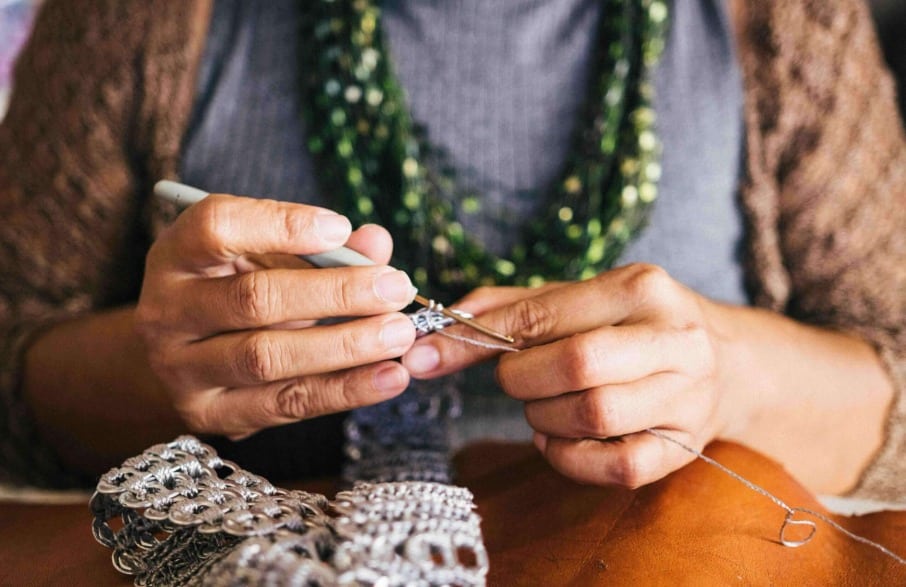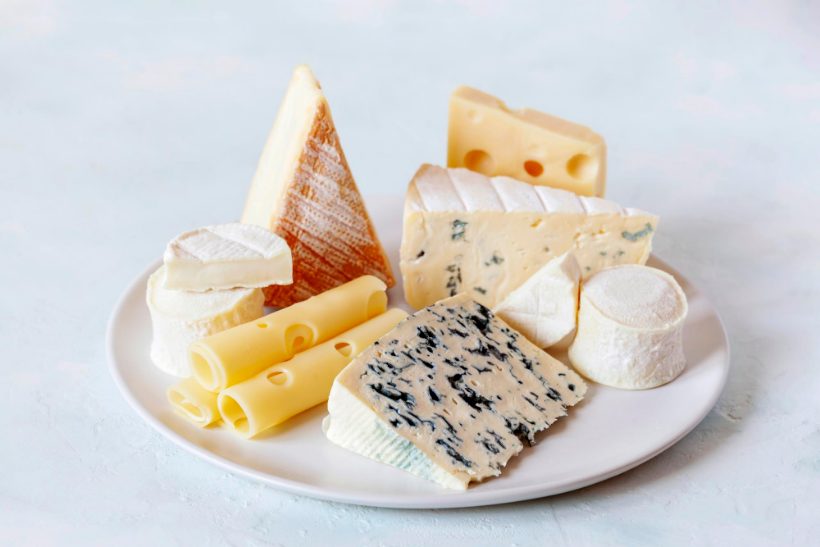Ever considered taking up knitting? Well, if yes, you’re in good company. It is because a whopping 45 million Americans (Knitting Statistics and Data) know how to knit or crochet. But, beyond being a trendy hobby, knitting has more to it. Knitting and crocheting is more than crafting cute scarves or cozy blankets. It is the ultimate stress-busting way you didn’t know you needed. In this blog, we’ll learn the many health benefits of knitting. Knitting is not only for your grammy. Although she might be a pro! We’re talking about how it’s a fantastic way for you to reduce anxiety and stress. And there’s more to it. So, if you’re looking for a way to unwind and boost your well-being, keep reading.
Knitting Is a Craft for All Ages
Let’s debunk the myth – that knitting is for wise old souls. Here’s the scoop: knitting is for everyone, and that includes you. Not only is it super relaxing, but it’s also not limited by your age. In fact, knitting is one craft where age doesn’t matter one bit. Whether you’re a teenager or a retiree, knitting can be your thing. Imagine sitting back, clicking those needles, and creating something beautiful. Did you know most women aged 25-40 usually buy knitting products?
Yup, you read that right. 73.9% of all knitters are women, while 26.1% are men (source: craftyarncouncil.com). So, don’t let stereotypes hold you back. Whether you’re young or young at heart, knitting is the craft waiting for you.
Health Benefits of Knitting
By using knitting needles and getting creative, you can enjoy the health benefits.
Stress Reduction
Knitting provides an ideal escape from the hustle and bustle of daily life. The rhythmic, repetitive actions of knitting can help reduce stress and anxiety. A study from the University of British Columbia found that knitting led to lower heart rates. Along with this, it reduces stress responses.
Key take-away: If you’re feeling the weight of everyday stress, grab your needles and knit them away.
Enhanced Cognitive Skills
Engaging in knitting isn’t only about creating beautiful garments. It’s also an exercise for your brain. Knitters often need to focus on complex patterns and keep track of stitches. This not only sharpens your cognitive skills but also enhances your memory. Research from Harvard Medical School shows a surprising statistic. It says knitting can reduce the risk of age-related cognitive impairment by up to 30% (source: henryford.com).
Key take-away: Knitting is not just a creative hobby; it’s a brain-boosting activity. It enhances cognitive skills, memory, and reduces the risk of age-related cognitive impairment by up to 30%.
Pain Management (Physical benefits of knitting)
Dealing with chronic pain or conditions like arthritis? Knitting might be your natural painkiller. The repetitive motion of knitting can stimulate the production of endorphins. These are your body’s natural pain relievers. The Journal of the American Geriatrics Society revealed another startling fact.
Key take-away: Crafts like knitting can reduce pain and depression.
Improved Fine Motor Skills
Knitting involves intricate hand movements. In turn, it makes it an excellent way to boost your fine motor skills. This is particularly beneficial for children who are still developing these skills. Knitting can help improve dexterity, hand-eye coordination, and finger flexibility. It’s like an exercise for your hands, keeping them agile and nimble.
Key take-away: Knitting is a great way to enhance fine motor skills, making it especially beneficial for children. It improves dexterity, hand-eye coordination, and finger flexibility, keeping hands agile and nimble.
Social Connection (Social benefits of knitting)
Knitting isn’t a solo struggle; it can be a wonderful way to connect with others. Joining knitting groups or crafting with friends can foster a sense of community. Social interaction can reduce feelings of isolation and loneliness. The British Journal of Occupational Therapy found a link between knitting & happiness. How often do you knit? That’s the key. In this way, it improves your mental and emotional well-being.
Key take-away: Knitting fosters community and social connection, reducing feelings of isolation. The frequency of knitting is key to improving mental and emotional well-being, as shown in a study from the British Journal of Occupational Therapy.
Ease Anxiety Fears (Mental health benefits of knitting)
A study found that over 75% of folks who picked up knitting reported feeling less fear and a clearer mind (source:. Creativehertfordshire.com) It’s not a hobby. It’s your secret to tranquility. If anxiety or eating disorders are something you suffer from, knitting might be your ally. Why not give it a try today and find serenity in every single stitch?
Key take-away: Knitting can provide tranquility and relief from anxiety. Over 75% of participants in the study experienced reduced fear and a clearer mind through knitting, making it a potential ally for those dealing with anxiety or eating disorders.
Prevent Memory Loss
Knitting can be your brain’s best friend! Mayo Clinic’s study reveals that brain exercises can slash the risk of memory loss. What’s more, knitting, quilting, or reading in good company can amp up the benefits. If you’re 50 or older, you can reduce memory loss risk by a whopping third! And guess what? Even in your 70s and 80s, it’s never too late to start. So, grab those needles and knit your way to a sharper memory today.
Key take-away: Knitting is a brain-boosting activity, with Mayo Clinic’s study indicating it can significantly reduce memory loss risk, especially for those aged 50 or older. The benefits of knitting on the brain can be enjoyed even in your 70s and 80s, making it a great way to enhance memory.
Knitting Is a Meditative Craft
Knitting and meditation might seem worlds apart, but they share similarities. When you knit, you focus on each stitch, your breath finds its rhythm, and your mind enters a peaceful flow. Like meditation, knitting is a form of mindfulness. It helps reduce stress and anxiety. It also enhances concentration and boosts your well-being. Do you know what medical researchers at Massachusetts General Hospital Benson-Henry Institute say? They say things like meditation can drop your blood pressure. And you know what else does the trick? Knitting! Yep, it’s like yoga or tai chi. Both activities offer a soothing escape from life’s chaos and can help you find your inner peace. Give it a try and experience the tranquil magic of knitting!
Key take-away: Knitting and meditation are similar in promoting mindfulness, reducing stress, and enhancing concentration. Medical researchers at Massachusetts General Hospital Benson-Henry Institute suggest that activities like knitting can lower blood pressure, like meditation, yoga, or tai chi. Both knitting and meditation offer a tranquil escape from life’s chaos and can help you find inner peace, making them worth trying for a serene experience.
Conclusion
Knitting isn’t a pastime; it’s a scientific stressbuster. When you knit, your brain releases dopamine, the “feel-good” chemical. Thus, it reduces stress and anxiety. This rhythmic activity also triggers your parasympathetic nervous system. Hence, it slows your heart rate and promotes relaxation. So, if you find yourself feeling frazzled, pick up those needles and yarn. It’s a simple and effective way to knit away your stress and embrace tranquility.
References
2005. A Pastime of Grandma and the ‘Golden Girls’ Evolves into a Hip Hobby. The New York Times. https://www.nytimes.com/2005/03/30/opinion/a-pastime-of-grandma-and-the-golden-girls-evolves-into-a-hip-hobby.html
2014. Knitting & Crocheting Are Hot. Craft Yarn Council. https://www.craftyarncouncil.com/know.html
2022. The Benefits of Knitting and Crocheting. Henry Ford Health. https://www.henryford.com/visitors/caregivers/care-connections/the-benefits-knitting-and-crochet
2013. The Benefits of Knitting for Personal and Social Wellbeing in Adulthood: Findings from an International Survey. Sage Journals. https://journals.sagepub.com/doi/abs/10.4276/030802213X13603244419077
2014. Mayo Clinic Reports That Knitting May Reduce Alzheimer’s Risk By 30-50%. Lion Brand Notebook. https://blog.lionbrand.com/mayo-clinic-reports-that-knitting-may-reduce-alzheimers-risk-by-30-50/







